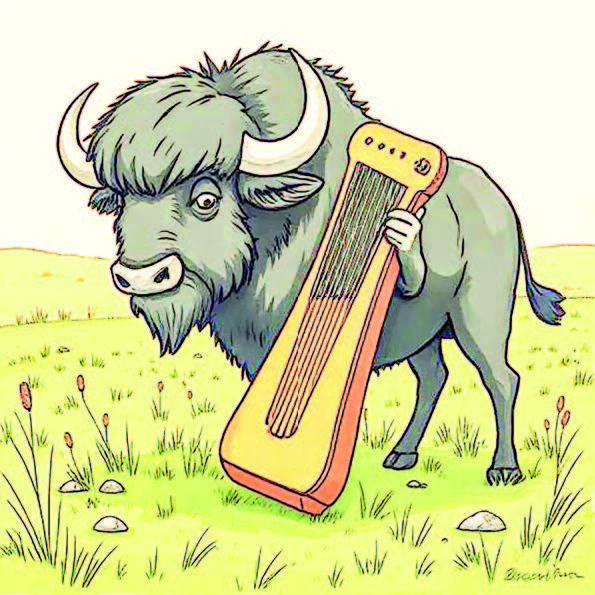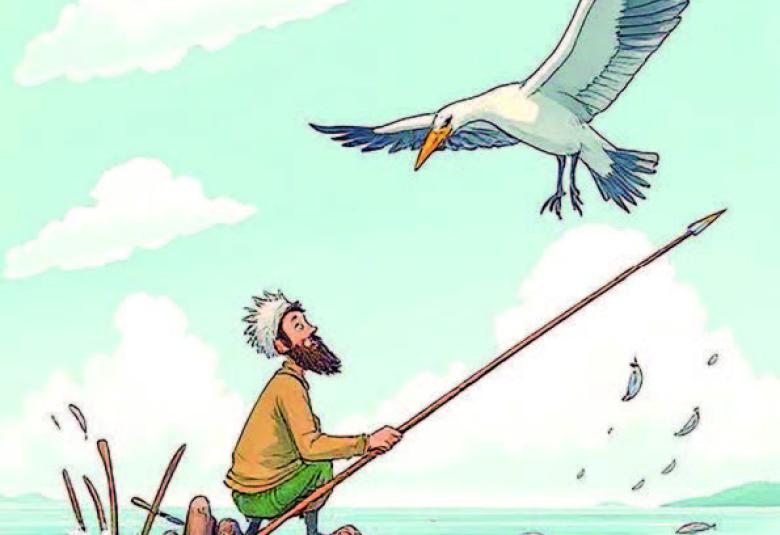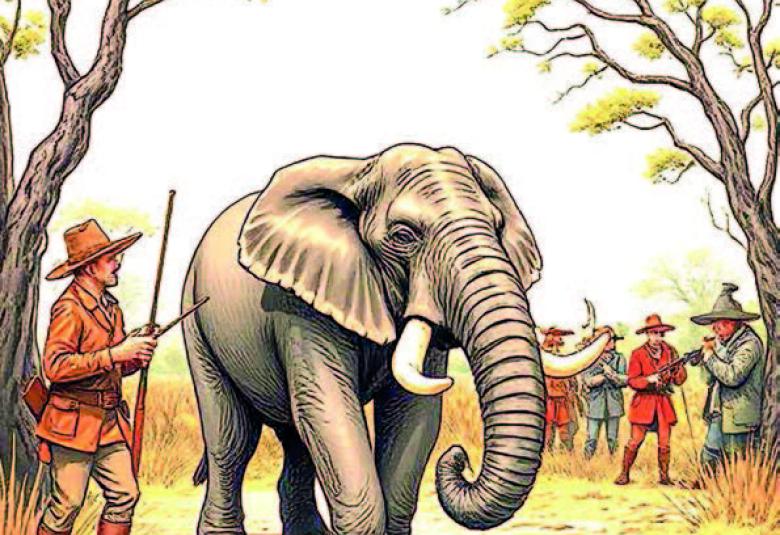By Augustin
PROVERBS are crucial to understanding and preserving a culture because they reflect shared values, beliefs, and wisdom passed down through generations.
ဆရာကာပြန် အာခေါင်လှံစူး
Don’t turn on your teacher, or bad things will happen.
“ဆရာကာပြန် အာခေါင်လှံစူး" ဆိုတဲ့ စကားပုံဟာ ကိုယ့်အပေါ် ကျေးဇူးရှိတဲ့ဆရာကို ကျေးဇူးကန်းတဲ့သူဟာ နောက်ဆုံးမှာ ပျက်စီးတတ်တယ်ဆိုတဲ့ အဓိပ္ပာယ်ကို ဖော်ညွှန်းပါတယ်။
ရှေးတုန်းက လူတစ်ယောက်က မြစ်ကမ်းနားမှာ ဗျိုင်းတစ်ကောင် ငါးဖမ်းနေတာ ကို သွားတွေ့တယ်။ ဗျိုင်းက ငါးကို လေထဲပစ်မြှောက်ပြီး ပါးစပ်နဲ့ ပြန်ပြီး ဖမ်းတာကိုတွေ့တော့ သူလည်း အဲ့ဒါကို အားကျပြီး အတုခိုးလေ့ကျင့်တော့တာပဲ။
ပထမတော့ သစ်ချောင်းလေးတွေနဲ့ စကျင့်တယ်။ နောက်ပိုင်းကျတော့ တဖြည်းဖြည်းနဲ့ အုတ်ခဲတွေ၊ လှံတွေ၊ ဓားတွေကိုတောင် လေပေါ်ပစ်ပြီး မြေကြီး ပေါ်မကျခင် ပါးစပ်နဲ့ ကိုက်ဖမ်းနိုင်တဲ့အထိ ကျွမ်းကျင်သွားတယ်။
သူ့ပညာကို တစ်ရွာဝင် တစ်ရွာထွက် လိုက်ပြတော့ လူတွေက အရမ်းသဘောကျပြီး ဆုတွေအများကြီးရတာပေါ့။ ဒီသတင်းက ဘုရင်ဆီရောက်သွားတော့ သူ့ကို နန်းတော်ထဲမှာ လာပြခိုင်းတယ်။ ဘုရင်က သူ့ပညာကို အရမ်းအံ့ဩပြီး “မင်းရဲ့ဆရာက ဘယ်သူလဲ” လို့မေးတော့ ဟိုလူက မာနတွေတက်ပြီး "ကျွန်တော့်မှာ ဆရာ မရှိပါဘူး၊ ကိုယ့်ဘာသာ တတ်တာပါ" လို့ လိမ်လိုက်တယ်။ ဗျိုင်းဆီက သင်ခဲ့တာကို ဝန်မခံချင်လို့ပေါ့။
အဲ့လိုပြောပြီး နောက်တစ်ခါ လှံနဲ့ ပြန်ကစားတဲ့အချိန်မှာပဲ ကံဆိုးစွာနဲ့ လှံက သူ့အာခေါင်ကို ထိုးစိုက်ဝင်သွားပြီး အဲ့နေရာမှာပဲ ပွဲချင်းပြီး သေသွားရော။
ပုံပြင်က ပေးတဲ့ သင်ခန်းစာ
ကိုယ့်အပေါ်ကျေးဇူးရှိတဲ့ ဆရာကို ဘယ်တော့မှ မမေ့ရဘူး၊ ကျေးဇူးမကန်းရဘူး ဆိုတာပါပဲ။ ဆရာဆိုတာကလည်း ကိုယ်တိုင်သင်ပေးတဲ့ "သင်ဆရာ”၊ သူများလုပ်တာကို ကြည့်ပြီးအတုယူတတ်မြောက်ခဲ့တဲ့ “မြင်ဆရာ” (ဒီပုံပြင်ထဲက ဗျိုင်းလိုမျိုး)၊ ကြားဖူးနားဝနဲ့ တတ်သိနားလည်စေတဲ့ “ကြားဆရာ” ဆိုပြီး သုံးမျိုးလုံးရဲ့ ကျေးဇူးကို လေးစားရမယ်လို့ ပြောတာပါ။
This Myanmar proverb, “ဆရာကာပြန် အာခေါင်လှံစူး”, is like saying, “Don’t turn on your teacher, or bad things will happen.” It means if someone helps you learn or grow, and you act mean or ungrateful to them, you’ll end up in trouble.
The Myanmar proverb warns against being ungrateful to those who help you learn or grow. If you treat your teachers or mentors badly, you’ll likely face negative consequences.
This wisdom comes from a story about a man who learned amazing spear-catching tricks by watching a crane. He practised until he could catch even knives in his mouth! People loved his shows, and the king invited him to perform.
However, when the king asked who taught him, the man, full of pride, lied and claimed he had no teacher. Immediately after this, during his next performance, a spear tragically went into his throat, killing him.
The story teaches us a vital lesson: always remember and respect those who taught you. This includes direct teachers, those you learn from by observing, and even those who offer wise advice. Disrespecting your teachers, like the man in the story, can lead to your downfall.
USAGES:
“Don’t bite the hand that feeds you.”
- Definition: Do not harm or show ingratitude to those who help or support you.
- Example: After receiving so much help from his mentor, he knew better than to bite the hand that feeds him.
“Don’t forget where you came from.”
- Definition: Remember the people and experiences that helped you achieve your current success.
- Example: As she became more successful, she always reminded herself not to forget where she came from and to honour her mentors.
ဆင်သတ် အရပ်ဝေ
Kill an elephant and share it with the village
“ဆင်သတ် အရပ်ဝေ” ဆိုတဲ့ မြန်မာစကားပုံက ဆင်တစ်ကောင်ကိုသတ်ပြီး သူ့အသားကို ရပ်ရွာထဲ ဝေပေးတယ်လို့ တိုက်ရိုက်အဓိပ္ပာယ်ရတယ်။ တကယ်တော့ “ဆင်” ဆိုတာ ကြီးမားတဲ့ အခက်အခဲ ဒါမှမဟုတ် အကျိုးအမြတ်ကြီးတစ်ခုကို ပြောတာ။ အဲ့ဒီလိုကြီးမားတဲ့ အောင်မြင်မှုရတဲ့အခါ ကိုယ်တစ်ယောက်တည်းမယူဘဲ ပတ်ဝန်းကျင်နဲ့ မျှဝေခံစားဖို့ ဆိုတဲ့သဘောပါ။ “မျှဝေခြင်း” နဲ့ “အများအကျိုးဆောင်ရွက်ခြင်း” ကို ဖော်ညွှန်းတာပေါ့။
ဒီဘက်ခေတ်လူငယ်တွေအတွက် ဒီစကားပုံက နားမလည်စရာဖြစ်နေတယ်။ ဘာလို့လဲဆိုတော့ အခုခေတ်မှာ ဆင်သတ်တာက ဥပဒေနဲ့ငြိတဲ့ ကိစ္စ၊ ပြီးတော့ တကယ်လည်း ဆင်သတ်ပြီး အသားဝေတာမျိုး မရှိတော့ဘူးလို့ ထင်ကြလို့ပါ။ ဒဏ္ဍာရီဆန်တယ်လို့ ခံစားရတာပေါ့။
ဒါပေမဲ့ တကယ်တော့ ဒီစကားပုံက ပုံပြင်မဟုတ်ဘူးဆိုတာ ဇင်ဘာဘွေနိုင်ငံက ဖြစ်ရပ်တစ်ခုက သက်သေပြနေတယ်။ အဲ့ဒီမှာ ဆင်ဦးရေ အရမ်းများလာလို့ ဂေဟစနစ်ကို ထိခိုက်လာတဲ့အခါ အစိုးရက ဆင်အကောင်ရေကို လျှော့ချရပြီး သတ်တဲ့ဆင်တွေရဲ့ အသားကို ဒေသခံတွေကို ပြန်ဝေပေးခဲ့တယ်။ ဒါဟာ ရှေးခေတ်မြန်မာတွေ ရွာကိုဒုက္ခပေးတဲ့ ဆင်ကိုသတ်ပြီး ဝေတာနဲ့ အနှစ်သာရချင်း တူတူပဲ။
AFP သတင်းက သက်သေပြ
ဇင်ဘာဘွေနိုင်ငံမှာ ဆင်တွေ အရေအတွက်အရမ်းများလာပြီး သူတို့ရဲ့ဂေဟစနစ်က လက်မခံနိုင်တော့တဲ့ အခြေအနေ (overpopulation) ဖြစ်လာပါ တယ်။ Save Valley Conservancy ဆိုတဲ့ ကြိုးဝိုင်းက ဆင်အကောင် ၈၀၀ ပဲ ထိန်းသိမ်းနိုင်ပေမယ့် တကယ်တမ်းမှာ ၂,၅၅၀ ကျော်ရှိနေတယ်လို့ ဆိုပါတယ်။ ဒီပြဿနာကိုဖြေရှင်းဖို့ အာဏာပိုင်တွေက ဆင်အကောင်ရေလျှော့ချဖို့အတွက် ဆင်တွေကို “cull” လုပ်ရပါတယ် (စီမံခန့်ခွဲမှုအရ လိုအပ်လို့ သတ်ဖြတ်ရခြင်း)။ အဲ့ဒီလိုသတ်လိုက်တဲ့ ဆင်တွေရဲ့ အသားကို ဒေသခံတွေကို ဝေငှပေးတယ်လို့ သတင်းမှာ ဖော်ပြထားပါတယ်။ ဒါဟာ “ဆင်သတ် အရပ်ဝေ” လုပ်ဆောင်လိုက်တာပါပဲ။ ဆင်စွယ်ကိုတော့ နိုင်ငံတော်ပိုင်အဖြစ် သိမ်းဆည်းလိုက်ပါတယ်။
Zimbabwe to cull elephants and distribute meat to people. SOURCE: AFP (4 Jun 2025)
The Myanmar saying “ဆင်သတ် အရပ်ဝေ” literally means “kill an elephant and share it with the village.” But it’s really about something bigger. “Elephant” here means a huge problem or a big success. So, when you achieve something great or get a lot of good stuff, you shouldn’t keep it all to yourself. You should share it with others in your community. It’s all about being kind and sharing what you have.
Today, some young people might think this saying doesn’t make sense. That’s because killing elephants is against the law now, and it seems like something from a long, long time ago. They might think it’s just a story.
But guess what? This saying isn’t just an old tale. A recent news story from Zimbabwe proves it’s still true in real life! In Zimbabwe, there were too many elephants, and it was causing problems for their natural habitat. To fix this, the government had to reduce the number of elephants. They even gave the meat from those elephants to the local people. This is just like the old saying: a big “elephant” problem was solved, and the benefits were shared with the community.
နောက်ထပ်အဓိပ္ပာယ်
“ဆင်သတ် အရပ်ဝေ” ဆိုတဲ့ မြန်မာစကားပုံရဲ့ နောက်ထပ်အဓိပ္ပာယ်တစ်ခု ကတော့ တန်ဖိုးအရမ်းကြီးတဲ့အရာတစ်ခုကို မလိုအပ်တဲ့၊ အရေးမပါတဲ့ကိစ္စအတွက် အလဟဿဖြုန်းတီးပစ်တာကို ပြောတာပါ။ ဆင်လို ကြီးမားခမ်းနားတဲ့အရာတစ်ခုကို သေးသေးဖွဲဖွဲကိစ္စလေးအတွက် သုံးပစ်လိုက်တာမျိုးပေါ့။ ဥပမာ၊ ဈေးကြီးတဲ့ ပစ္စည်းတစ်ခုကို အလကားလိုဖြစ်အောင် သုံးပစ်လိုက်တာမျိုး ဒါမှမဟုတ် ကြီးမား တဲ့စွမ်းရည်တစ်ခုကို မဟုတ်တဲ့နေရာမှာ သုံးတာမျိုးကို ရည်ညွှန်းပါတယ်။ တန်ဖိုးရှိတဲ့ အရင်းအမြစ်တစ်ခုကို ထိုက်တန်တဲ့နေရာမှာ မသုံးဘဲ အချည်းနှီးဖြစ်အောင် လုပ်ပစ်တာကို ဆိုလိုရင်းပါ။
(ဆင်ကို သတ်၍ အရပ်ကို ဝေသကဲ့သို့ အလွန်တန်ဖိုးကြီးမားလှသည့်အရာကို အရေးမကြီးသော ကိစ္စအတွက် အလဟဿ ဖြုန်းတီးပစ်သည်။)
ဆင်သတ် အရပ်ဝေis a Myanmar proverb that literally means “kill an elephant to share with the village.” But its real meaning is about wasting something very valuable on something unimportant. It’s like using a huge, powerful elephant for a tiny, useless task, showing you’re throwing away something big for nothing.
“throw good money after bad”
- Definition: To spend more money on a bad situation or failed effort, hoping to improve it, but only losing more money in the process.
- Example: “I’ve already spent so much fixing this old car, but it keeps breaking down. I’m afraid I’m just throwing good money after bad.”
“use a sledgehammer to crack a nut”
- Definition: To use an overly powerful, complex, or forceful method to solve a simple or minor problem.
- Example: “Hiring a huge consulting firm just to organize our office supplies felt like using a sledgehammer to crack a nut.”
ကျွဲပါးစောင်းတီး
Like playing a harp to a buffalo
ကျွဲပါးစောင်းတီးဆိုတဲ့မြန်မာစကားပုံက “ကျွဲကိုစောင်းတီးပြတာ” လို့အဓိပ္ပာယ် ရတယ်။ ပြောချင်တာက တန်ဖိုးရှိတဲ့အရာ၊ လှပတဲ့အရာ ဒါမှမဟုတ် ခက်ခဲတဲ့အရာတစ်ခုကို နားမလည်တဲ့သူ၊ တန်ဖိုးမထားတတ်တဲ့သူကို သွားပြောပြရင် အချိန်ကုန် လူပင်ပန်းပဲ အလကားဖြစ်တယ်ပေါ့။ ဥပမာ၊ ကျွဲကို စောင်းတီးပြရင် သူနားလည်မှာ မဟုတ်ဘဲ ဆူညံသံလို့ပဲ ကြားမှာမျိုး။ ဒါကြောင့် တစ်ခုခုကို တန်ဖိုးမထားတတ်တဲ့သူ၊ ယဉ်ကျေးမှုမရှိတဲ့သူကို သွားပြောပြရင် အချည်းနှီးဖြစ်တယ်လို့ ဆိုလိုရင်းပါပဲ။
This Myanmar proverb, literally meaning “playing a harp to a buffalo”, is used when you’re trying to explain something beautiful, important, or complex to someone who just won’t get it.
This saying means you’re trying to show something good or fancy to someone who won’t understand or care about it.
Think about playing a nice, soft song on a harp for a buffalo. The buffalo won’t enjoy the music or know how special it is. It will just hear sounds.
So, when we say “like playing a harp to a buffalo,” we mean that it’s pointless to offer something wonderful to someone who doesn’t appreciate it. It’s often used when someone is not very educated or doesn’t care about nice or valuable things, making your efforts useless.
“Cast pearls before swine”
- Definition: To offer something valuable or excellent to people who do not understand its worth or appreciate it.
- Example: “Trying to explain the complex poetry to my distracted little brother was like casting pearls before swine.”
“Water off a duck’s back”
- Definition: Used to describe criticism or advice that does not affect someone. The person simply ignores it.
- Example: “I tried to tell him that his bad habits would hurt his health, but it was just water off a duck’s back.”
3. Fall on deaf ears
- Definition: To be ignored or disregarded. This idiom is often used when advice, warnings, or pleas are not listened to.
- Example: “Her warnings about the upcoming budget cuts fell on deaf ears until it was too late.”




